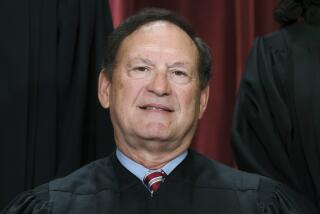Reynolds Accuses Justice of Misinterpreting 14th Amendment : Rights Enforcer Assails Brennan’s View of Constitution
- Share via
WASHINGTON — Assistant Atty. Gen. William Bradford Reynolds, the Reagan Administration’s chief civil rights enforcer, has denounced Supreme Court Justice William J. Brennan Jr. by name for “radically egalitarian jurisprudence” founded on misinterpretation of the Constitution’s 14th Amendment.
Brennan’s construction of the amendment, which was adopted in 1868 to assure “equal protection of the laws” to freed slaves, “looks suspiciously more like a political or social agenda than a jurisprudential theory of the law,” Reynolds said in a speech delivered Friday night at the University of Missouri Law School in Columbia, Mo.
After the text was made available here by the Justice Department, Supreme Court spokesman Toni House said Brennan would have no comment on Reynolds’ remarks.
Unusually Abrasive
Reynolds’ unusually abrasive speech was in tune with views voiced by President Reagan and Atty. Gen. Edwin Meese III, who have criticized the Supreme Court--without naming individual justices--for a trend toward decisions that they contend have forsaken strict interpretation of the Constitution in favor of “judicial activism” that tailors laws to developing circumstances.
In Reynolds’ view, “This brand of jurisprudence and its policy particulars derive from a liberal social agenda in which Justice Brennan shares. And that agenda has little or no connection with the Constitution, the Bill of Rights or any subsequent amendment.”
Reynolds focused his criticism on a speech Brennan delivered on Aug. 8 before an American Bar Assn. convention audience in New York that commended the high court’s interpretation of the 14th Amendment. Brennan called the amendment “the legal instrument of the egalitarian revolution that has transformed contemporary American society,” and observed that it has protected “a broad range of civil rights and liberties.”
Rights and Liberties
Reynolds maintained that many of these rights and liberties lack “clear textual roots,” and went on to argue against the principle of affirmative action, developed by the courts to provide preferences in employment and education for historically disadvantaged minorities.
This approach, Reynolds argued, leads toward a new doctrine of “separate and proportionate” treatment for its beneficiaries that is “no less obnoxious” than the “separate but equal” standard for public accommodations outlawed by the Supreme Court in 1954.
While Reynolds endorsed the principle that “the Constitution is and must be understood to be ‘colorblind,’ ” he said it should not be extended to become “merit-blind” and intolerant of “public policy based on notions of human excellence.”
The framers based the Constitution, Reynolds said, on “a theory of liberty and equality that at once takes rights seriously and takes the individual seriously” and shunned “legally imposed burdens based on morally irrelevant characteristics, be they religious, political or racial.”
‘A Theory of Equality’
“This is a theory of equality,” Reynolds said, “that rejects the idea that preferential treatment on the basis of morally irrelevant characteristics is acceptable . . . that finds a doctrine of separate and proportionate as much at odds with our tradition of constitutional liberty as the properly discarded standard of separate but equal.”
Stressing the importance of “our written Constitution to the security of our rights,” Reynolds warned: “Nothing threatens our civil rights and political liberties more than a theory that sees their protection as the result of the benevolence of any public official or any particular institution of government.”
He called such a theory evident in “the judicial inclinations of Justice Brennan,” but termed it unconvincing because it is “insensitive to the reality that rights are truly secured only by limiting government.”
More to Read
Get the L.A. Times Politics newsletter
Deeply reported insights into legislation, politics and policy from Sacramento, Washington and beyond. In your inbox twice per week.
You may occasionally receive promotional content from the Los Angeles Times.










